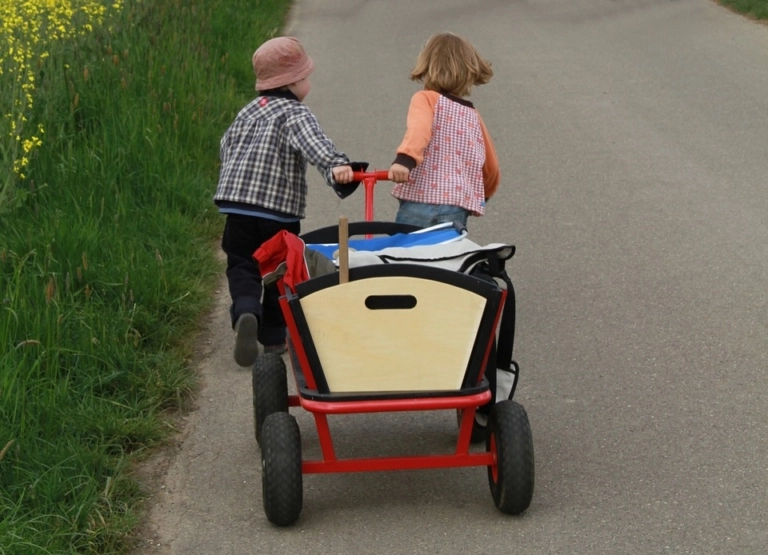Moving with children: Listen to them and get them involved
Moving house can be a stressful and overwhelming process, especially if you have children. Changes in environment and routine can be difficult for the youngest members of the household. However, with a little planning and strategy, moving can be an opportunity to grow as a family and make new memories together. In this article, we'll present 11 practical tips for coping with moving house with children, from using audio-visual resources to involving children in decorating and personalising the new home. With these strategies, you can make the move an exciting and positive experience for the whole family.
11 tips for coping with a move with children
1. Use audio-visual resources such as films or stories to support your children.
A Relocation service in Madrid or to any part of the national territory o international Moving house can be a difficult change for children. To help them cope, it is advisable to use audiovisual resources to help them understand the moving process and feel more comfortable with the changes ahead. Films or stories about moving can be a very useful tool to convey information and reassurance.
2. Use positive language to talk about the move
It is important to use positive and optimistic language when talking to your children about the move. Try to emphasise the positive aspects of the move and encourage them to see the experience as an exciting adventure in which they can discover new and exciting things.
3. Moving in summer, a preferred option
If you have the choice of when to move, it is advisable to move during the summer. The warmer weather makes it easier to move items and belongings, and children won't have to worry about adjusting to a new school or school environment. school environment.
4. Inform your children about upcoming changes with transparency.
It is important that you talk to your children about the upcoming changes with transparency. Explain the reasons for the removal, the new place they will be moving to and what to expect there. This will help them feel more confident and reduce their anxiety.
5. Involve children in decorating and personalising their new home.
One of the best ways to help children feel more comfortable about moving is to involve them in decorating and personalising their new home. Ask them to choose the wall colours or decorate their own room. This will give them a sense of control and help them feel that they have a space of their own in the new place.
6. Stay calm and enjoy the moving process as a family.
Moving can be stressful, but it can also be an opportunity to enjoy family time and make new memories. Try to stay calm and encourage your children to get involved in the moving process. Make them feel part of the process and celebrate small achievements at each stage of the process.
7. Deal with changes, one at a time and without haste.
It is important to deal with the upcoming changes gradually and without haste. Try not to overwhelm your children with too much information at once and take things slowly. Every change can be an opportunity to grow and to make new friends.
8. Be sure to take extra care with your children's personal belongings.
When you're in the middle of moving house, it's easy to lose sight of children's personal belongings. Be sure to take extra precautions to prevent them from getting lost or damaged in the process. Sometimes it can be helpful to simply hire a Furniture storage service. Remember to pack your things carefully and label them clearly. You can also make a list of the most important things and make sure they are at hand during the whole moving process.
9. Practice patience and empathy with your children during the move.
Moving house can be a stressful and anxious time for children, and it is important that you practise patience and empathy with them. Listen to their concerns and try to answer their questions clearly and honestly. Encourage them to express their emotions and try to support them at all times.
10. Discover together the new place where you will move to.
Once you have arrived at your new home, it is important that you discover the place together. You can take a tour of the house and neighbourhood, explore the local parks and shops, and get to know your new neighbours. This will help you feel more comfortable and establish a connection with your new home.
11. Return to normal routines as soon as possible
Finally, it is important that they try to get back to their usual routines as soon as possible. Maintain their eating and sleeping schedules, and try to establish a daily routine. This will help them feel more secure and adapt more easily to their new home.
In conclusion, moving house can be a difficult change for children, but there are a number of ways in which they can cope successfully. It is important to use audiovisual resources to support them and to talk about the move in positive language. It is also advisable to involve children in decorating and personalising their new home, and to remain calm and enjoy the moving process as a family. In addition, extreme care should be taken with children's personal belongings, and patience and empathy should be practised with them during the moving process. House relocation e.g. to Palma de MallorcaDiscover together the new place where you will be moving to, and try to get back to the usual routines as soon as possible. By following these recommendations, you can make the move an exciting and positive experience for the whole family.
Children should be involved when moving house: The youngest members of the family should not go unnoticed when moving house, as it is a big change of life and it is important to know how to deal with the move so that the children do not become unsettled.
How can moving house affect children?
The major changes involved in moving house can affect adults, but also the youngest members of the family, who may be affected by certain symptoms. Although it is not the same in all cases, it is common for children to suffer from stress due to the disruption of sleep routines, mealtimes, etc. It is also possible that problems of nervousness and hyperactivity may arise or that are confused as they do not understand why the change is taking place..
It is therefore important to informing children in advance about the fact that a move is about to take place. Whatever their age, it is a good idea to sit down with your children and tell them about the change that is about to take place in their lives. The best thing to do is to be as honest as possible and explain to them the reason for the moveThe new home will be a great place to live, and at the same time, they will be introduced to the aspects they will like most about their new home.
Recommendations to follow
- Tell them what is going to happen in the next few days.
- He answers all your questions and doubts.
- Involve them in this process.
- It creates an illusion.
- Emphasise the positive aspects of the new home and the new environment.
There are children who, exceptionally, adapt easily to their new life; but for most children, one of the biggest challenges is adapting to their new life. NEW SCHOOL and the fact that they have to meet new friends. This is one of the things that you should communicate to your children as soon as possible, showing them at all times the support parenting and trying to make them understand that they will not lose their friends from the other neighbourhood or from the previous school and that they will be able to continue to see them as often as possible.

The most important thing is that you take the time to talk to them. Listen to them and try to understand their grievances, but always try to provide them with a positive vision of change without raising false expectations. If the move is the consequence of a difficult family situation, such as a divorce or the death of a relative, it is essential that you keep the mood as positive as possible, as children need you to convey this to them at this time. security and peace of mind.
When is the best time to move?
If circumstances permit, ideally, the following should be done visit your new home before the transfer, for example, during the period where studies the relocation budget so that they become familiar with their surroundings and appreciate the positive things their new home has to offer (parks, swimming pools, sports centres, nearby shopping centres, etc.).
It is preferable to moving during holiday periodsThey will not have homework, assignments or exams and will be able to adapt better to the new situation.
During the moveunless they are very young, in which case it is advisable for them to stay with a relative or friend, involve them. Let them pack their personal and valuable things, let them decide as much as possible what they want to take with them and what they don't. Encourage them to choose their room, the colour of the walls, take them to buy new furniture if necessary. Encourage them to choose their room, the colour of the walls, take them to buy new furniture if necessary (although it is recommended to keep their room the same as before so that they do not notice too many changes).
The most important thing is to make them discover the positive side of the process so that everything will flow and the move becomes an exciting one. Involving children in the moving process by making it a fun activity is important for them to feel comfortable with the change.
In short, it approaches relocation with positive mindsetwith patience and listening to and involving your children to make them feel part of a decision that will change your lives, but that can turn into something fun. Approach it as a little adventure.








